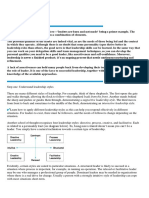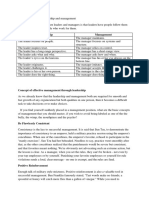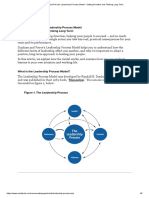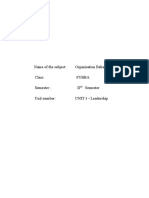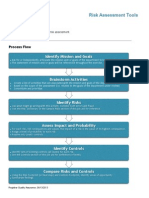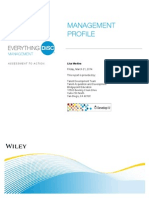Mentor Program Lessons in Leading
Mentor Program Lessons in Leading
Uploaded by
api-255216529Copyright:
Available Formats
Mentor Program Lessons in Leading
Mentor Program Lessons in Leading
Uploaded by
api-255216529Original Title
Copyright
Available Formats
Share this document
Did you find this document useful?
Is this content inappropriate?
Copyright:
Available Formats
Mentor Program Lessons in Leading
Mentor Program Lessons in Leading
Uploaded by
api-255216529Copyright:
Available Formats
UPPER MANAGEMENT:
Lessons in Leading
A Mentor Program
UPPER MANAGEMENT: LES S ONS I N LEADI NG
A Mentor Program
Lisa Medina
Assoc. Director of Quality Assurance
Ashford University
1
Table of Contents
Know Your Leadership 2 ............................................................................................................
Know Your Peers 4 ......................................................................................................................
What Do They Do All Day? 5 ....................................................................................................
Managing Managers 6 ..................................................................................................................
Knowledge and Resources 8 .......................................................................................................
2
1
Know Your Leadership
Good leaders inspire us. They provide direction and purpose they provide a vision for
the future. However, in a large organization it is not always easy to know these leaders
instead, we must seek out the inspiration by learning about the people that are
piloting this adventure!
T
he senior leadership team at Ashford University is comprised of the following individuals:
Dr. Richard Pattenaude, President and Chief Executive Officer
Dr. Elizabeth Tice, Executive VP and Chief Academic Officer
Dr. Rebecca Wardlow, Provost
Dr. Joseph Hoey, Executive VP and Chief of Staff
Dr. Christina Leimer, VP of Planning and Effectiveness
Sean Gousha, Senior VP of Enrollment Management
Sheri Jones, Senior VP of Administrative Services
Thomas Mead, VP of Finance
Combined, these individuals bring more than 150 years experience in higher education. In addition,
their diverse backgrounds make for a dynamic, far-reaching leadership team. What about this group of
leaders interests or perhaps inspires you?
To find out select an individual listed above and research
more about his or her background, areas of focus, etc.
Identify 2-3 leadership traits or facts about this leader
that intrigue or motivate you.
2
Exercise:
Read the article Leading in the 21
st
Century by Barton,
Grant and Horn.
In your opinion, what is the most important role of an executive leader in the 21
st
century? How
would you evaluate the executive leaders at Ashford University in this capacity?
Moya Greene claims that The first criterion is: do you love it? Why do you work at Ashford University?
Do you love it? How (if at all) do you feel this should be reflected in the senior leadership team?
Do you agree or disagree with Carlos Ghosns statement, I don't think leadership shows unless it is
highlighted by some kind of crisis. How might you relate this statement to the current circumstances and
leadership at Ashford University?
3
Analysis and Opinions:
Know Your Peers
At every level of an organization, teamwork is critical a leadership team is no exception. And, while
several approaches to leadership are universal, the people must make it work. And since people are unique,
bringing their own experiences, personalities and ideas to every interaction, to be a good team member, you
must know your teammates.
In the Registrars Office, the leadership team is comprised of the following individuals:
Kirk Morrison, VP University Registrar
Michael Foehrkolb, Associate Director of Articulation/Military Partnerships
Brooke Judkins, Associate Registrar
Michael Kieffer, Associate Director of Imaged Records Management
Lisa Medina, Associate Director of Quality Assurance
Katie Scheie, Director of Matriculation
Tracy Bormann, Director of Matriculation
Jennifer Bargenquast, Associate Director of Matriculation
Lai Zitoun, Associate Director of Matriculation
While only 5 individuals listed above report directly to Kirk, this is considered the core leadership team of
the Registrars Office. In other words, as an Associate Director, these are your teammates!
Based on your experience, what challenges might you
encounter in joining a new team? What challenges do
you anticipate in joining this team? What strategies
would you employ to overcome them?
4
Exercise
What Do They Do All Day?
How to describe a day in the life of a Director? One word: meetings! And while these meetings may
often seem tedious and excessive, they are often necessary. However, the key to managing your time
wisely as an upper manager is to attend only the most effective and valuable meetings. Here are a few:
Policy and Implementation Council: Tuesdays 11am-12pm
By their own definition, the Policy and Implementation department supports student-related
policies and procedures within Academic Catalogs, SOPs, Job Aids, etc., facilitates organizational
change processes via the P&I Council and ensures accuracy and integrity through Communications
Review. As such, the purpose of the P&I Council meeting is to facilitate organizational change
by forming workgroups, informing stakeholders and ensuring appropriate update of policy.
Registrar and Academic Transfer Credit Committee: Mondays, 2pm-3pm
This meeting is comprised of representatives from Academics, Articulation, Matriculation and
Student Records. The purpose of the meeting is to examine questions or concerns related to
transfer credit.
Online Leadership: Fridays, 9am-10am
Each week, the Registrar (online) leadership team meets to share updates on on-going and new
initiatives, receive information from Kirk and generally spend time together as a group.
Admission Review Committee: Thursdays, 2pm-3pm
The Admission Review Committee is comprised of high-level stakeholders from multiple
departments, including Legal, Admission Compliance, Employee Relations, Student Affairs,
Registrar and Admissions. This group reviews sensitive issues relating to academic disqualification,
student aid fraud and employee dishonesty.
One-on-One (Reports): Weekly
Yes as a Director, these are still a must. Of course, it is imperative that any supervisor keep these
set appointments, but they become increasingly more important the higher up the management
chain you go. This is the opportunity to remain aware of on-going initiatives, team performance and
general satisfaction/stress-level of your Managers.
Select one meeting among those described above that
you would like to learn more about, and request to
attend. Following the meeting, reflect on your
experience.
5
Exercise
Managing Managers
It was once said that the function of leadership is to produce more leaders, not more followers. What is most
powerful about this statement is that it applies to any organizational leadership position, regardless of level or
industry. Therefore, managing or leading managers is not significantly different from leading non-managers.
There are a few applications of leadership principles, however, that are specific to leading managers that will
ensure you produce more leaders!
Leading with Vision
A vision creates purpose and inspires. It provides direction and invents strategy. There is no question that
vision is absolutely vital to the success of a team. Managers, perhaps even more than those who do not
manage others, must have a firm understanding of the vision; this is primarily because a manager needs to
be prepared to answer questions, solve problems and motivate others in a way that is connected to the
vision for the team. As a Director, it is on your shoulders to ensure that the managers are equipped to
lead with this vision!
Explain, explain, and explain
It is often stated that communication is key in a complex organization. This is true. However,
communication for communications sake is not necessarily helpful. When it comes to providing
information to those who must pass it along to others, certain details are critical. One important detail: the
explanation. As a Director, you often have the privilege of insight your managers may not. So, you must
share! And, if you do not have the background, get it! Your managers (and their staff) will appreciate the
transparency and will likely be more inclined to go along with the message, however unpleasant.
Remain Connected
I have observed the expression of surprise of many leaders at all levels when they discover their team
is not performing as expected, or a process does not function as intended. Often, this is the result of
distance distance from the vision for the department and distance from the day-to-day work. While a
Director is incredibly busy, and must be concerned with decisions that require only a high-level
understanding of operations, a good leader should not be so disconnected from the department that he
or she can no longer relate to the team, or is not aware of initiatives and change. Instead, remaining
connected reduces surprise and also builds trust among team members, who feel that you care enough to
know their business!
Servant Leadership
Leadership comes in many forms and each works differently in its environment. In an office
environment where people sit in front of computers, talk on the phone, and, generally do administrative
work I have found that servant leadership is an effective form. It reminds the staff members that people
come first, despite the sometimes impersonal nature of their work.
6
Imagine you have been promoted to the Associate Director
role in the Registrars Office. Select 2-3 individuals and
imagine that they have become your management team.
Complete the following:
What is your vision? (This is the big question).
How do you ensure your managers lead with this vision?
What strategies will you employ to ensure that you remain connected to the happenings of the
department and the leadership efforts of your managers? (e.g. how will this remain a priority? Whom
might you consult for feedback and/or input?)
7
Exercise
Given the strengths and weaknesses of these particular individuals, how will you support them without
micro-managing or inadvertently stunting their independence and/or growth as leaders?
Read the article, Effective Leadership within a
Multinational Environment, paying close attention to the
universal principles of effective leadership.
Which of these principles do you feel is the most important? Why?
Knowledge and Resources
8
Analysis and Opinions
You might also like
- SliiDocument15 pagesSliiapi-25521652967% (3)
- Final Reflection Paper - Leadership Discovery ProcessDocument9 pagesFinal Reflection Paper - Leadership Discovery ProcessPrajakta PatilNo ratings yet
- Characteristics of A Good LeaderDocument5 pagesCharacteristics of A Good LeaderZeeshan AbidNo ratings yet
- Level Control (CLCS) Control Unit, Component DescriptionDocument1 pageLevel Control (CLCS) Control Unit, Component Descriptionrudi100% (1)
- 1 NuterationDocument36 pages1 Nuterationزينب القضيNo ratings yet
- Epicureanism Stoicism and Neo PlatonismDocument17 pagesEpicureanism Stoicism and Neo PlatonismJor Garcia100% (1)
- SPGN 251 Lesson Modification Project FinalDocument8 pagesSPGN 251 Lesson Modification Project Finalapi-494929426No ratings yet
- What Is Leadership Coaching?: Flow On EffectDocument15 pagesWhat Is Leadership Coaching?: Flow On EffectsrinivasanNo ratings yet
- 7 Improving Leadership SkillsDocument9 pages7 Improving Leadership SkillsFatimaNo ratings yet
- 7 Improving Leadership SkillsDocument9 pages7 Improving Leadership SkillsBengaliNo ratings yet
- 7 Improving Leadership SkillsDocument9 pages7 Improving Leadership SkillsKishananNo ratings yet
- 7 Improving Leadership SkillsDocument9 pages7 Improving Leadership SkillsJankiramNo ratings yet
- Think Creatively IIDocument9 pagesThink Creatively IIKirtanNo ratings yet
- 7 Improving Leadership SkillsDocument9 pages7 Improving Leadership SkillsKhuseeNo ratings yet
- Forget Your Past 2Document9 pagesForget Your Past 2RameshNo ratings yet
- Live at PresentDocument9 pagesLive at PresentKalaNo ratings yet
- 7 Improving Leadership SkillsDocument9 pages7 Improving Leadership SkillsHarshaNo ratings yet
- Leadership ChallengeDocument12 pagesLeadership Challengekwamedc1No ratings yet
- How To Create LeadersDocument28 pagesHow To Create LeadersAlexandru GygyNo ratings yet
- Leadership Development StrategyDocument73 pagesLeadership Development StrategygunawanaryakusumaNo ratings yet
- Coursework On LeadershipDocument5 pagesCoursework On Leadershipafayememn100% (2)
- ChhhaannDocument52 pagesChhhaannmohammed abdellaNo ratings yet
- Leadership ManagementDocument10 pagesLeadership ManagementGajanan Vinayak NaikNo ratings yet
- Management Skills FOR Effectiveness Assignment: FOR Prof. Shradha PadhiDocument8 pagesManagement Skills FOR Effectiveness Assignment: FOR Prof. Shradha PadhiArun Kumar SatapathyNo ratings yet
- Delegating Effectively: A Leader's Guide to Getting Things DoneFrom EverandDelegating Effectively: A Leader's Guide to Getting Things DoneNo ratings yet
- Job Aid Effective Delegation WorksheetDocument19 pagesJob Aid Effective Delegation WorksheetCosmin Corlatescu100% (2)
- OL 5&6 Chapter NotesDocument11 pagesOL 5&6 Chapter NotesAnitha ONo ratings yet
- Hello and Welcome To The Leadership MatrixDocument22 pagesHello and Welcome To The Leadership MatrixKhizar Irfan90% (1)
- BST Ca3Document6 pagesBST Ca3Taniya ChordiaNo ratings yet
- 5 Ways To Lead by Example in The WorkplaceDocument4 pages5 Ways To Lead by Example in The WorkplaceUn Soc100% (1)
- 5 Principles of Great ManagementDocument5 pages5 Principles of Great ManagementYram GambzNo ratings yet
- Dunham and Pierce's Leadership Process Model - Setting Direction and Thinking Long TermDocument5 pagesDunham and Pierce's Leadership Process Model - Setting Direction and Thinking Long TermThu Thủy ĐỗNo ratings yet
- Top 10 Tips To Improve Leadership Effectiveness at Your WorkplaceDocument12 pagesTop 10 Tips To Improve Leadership Effectiveness at Your WorkplaceSuperBeingsNo ratings yet
- Creating An Execution CultureDocument4 pagesCreating An Execution Culturejose_bolaños_85No ratings yet
- The Study of LeadershipDocument4 pagesThe Study of Leadershippriyanka pinkyNo ratings yet
- Enhance Self - Management SkillsDocument35 pagesEnhance Self - Management SkillsRoland RodriguezNo ratings yet
- Administrative Process in NursingDocument8 pagesAdministrative Process in NursingAngelyn GuevaraNo ratings yet
- Leadership Meaning, Traits and StylesDocument12 pagesLeadership Meaning, Traits and Stylescecilia padillaNo ratings yet
- Leading from Within: Unlocking the Power of Self-Leadership in the 21st Century OrganizationFrom EverandLeading from Within: Unlocking the Power of Self-Leadership in the 21st Century OrganizationNo ratings yet
- How Dare You Manage?: Seven Principles to Close the Ceo Skill GapFrom EverandHow Dare You Manage?: Seven Principles to Close the Ceo Skill GapNo ratings yet
- LEADERSHIP NNN (Autosaved) JJDocument35 pagesLEADERSHIP NNN (Autosaved) JJNimco SaleebaanNo ratings yet
- Leading From The Middle.: Checklist 041Document5 pagesLeading From The Middle.: Checklist 041Sofiya BayraktarovaNo ratings yet
- Case Analysis in HBODocument18 pagesCase Analysis in HBORobert GarlandNo ratings yet
- Leaders Don't Have to Be Lonely: Eliminate the loneliness and lead like a coachFrom EverandLeaders Don't Have to Be Lonely: Eliminate the loneliness and lead like a coachNo ratings yet
- !0 Skills of Leadership PDFDocument6 pages!0 Skills of Leadership PDFPrince Nornor-QuadziNo ratings yet
- Example Leadership Skills List: 10 Great Leader Qualities: Enter Your E-Mail Address Enter Your First Name (Optional)Document6 pagesExample Leadership Skills List: 10 Great Leader Qualities: Enter Your E-Mail Address Enter Your First Name (Optional)Abe riveraNo ratings yet
- Example Leadership Skills List: 10 Great Leader Qualities: Enter Your E-Mail Address Enter Your First Name (Optional)Document6 pagesExample Leadership Skills List: 10 Great Leader Qualities: Enter Your E-Mail Address Enter Your First Name (Optional)KyNo ratings yet
- Leader: Develop Remarkable Leaders Who Deliver Amazing ResultsDocument16 pagesLeader: Develop Remarkable Leaders Who Deliver Amazing Resultsshane_romero_2No ratings yet
- Leadership Skills For WomenDocument18 pagesLeadership Skills For WomendadandadanNo ratings yet
- Name of The Subject: Organisation Behavior Class: Fybba Semester: Ii Semester Unit Number: UNIT 3 - LeadershipDocument16 pagesName of The Subject: Organisation Behavior Class: Fybba Semester: Ii Semester Unit Number: UNIT 3 - LeadershipPoonam SachdevNo ratings yet
- LeadershipDocument9 pagesLeadershipNadia BilalNo ratings yet
- Activity 5 and Reaction Paper 5Document5 pagesActivity 5 and Reaction Paper 5SEYCHELLE ANN ORCININo ratings yet
- Management Leadership ThesisDocument8 pagesManagement Leadership Thesisaprilwbndsouthbend100% (2)
- 605Document6 pages605Pitaram PanthiNo ratings yet
- A Role of Leader in A Company With Reference To RelianceDocument24 pagesA Role of Leader in A Company With Reference To RelianceSayantani SamantaNo ratings yet
- Leadership BookletDocument22 pagesLeadership Bookletbunnypetite29No ratings yet
- Csir Decision Making and Problem Solving 2024 26-01-10!20!8Document19 pagesCsir Decision Making and Problem Solving 2024 26-01-10!20!8deepa T PatilNo ratings yet
- Revision Guide (Updated)Document16 pagesRevision Guide (Updated)Mohamed LisaamNo ratings yet
- 2csand M of SupervisorDocument45 pages2csand M of Supervisoryolanda f juan100% (1)
- Medina Lisa Resume MiracostaDocument2 pagesMedina Lisa Resume Miracostaapi-255216529No ratings yet
- Risk Assessment Job Aid1Document3 pagesRisk Assessment Job Aid1api-255216529No ratings yet
- Lisamedina MGMTDocument27 pagesLisamedina MGMTapi-255216529No ratings yet
- Strengthsquest 2010Document3 pagesStrengthsquest 2010api-255216529No ratings yet
- MasterlistDocument3 pagesMasterlistMaria AmulNo ratings yet
- MCQ For Obstetric-Gynecology Part A-SeleDocument37 pagesMCQ For Obstetric-Gynecology Part A-SeleReving Sagvan50% (2)
- Influence of Age Financial Status and Gender On AcDocument6 pagesInfluence of Age Financial Status and Gender On AcNCaparri CagayanNo ratings yet
- SolidsDocument70 pagesSolidskajalNo ratings yet
- Habits Min2Document5 pagesHabits Min2vrejie46No ratings yet
- Adobe Scan Apr 09, 2024Document14 pagesAdobe Scan Apr 09, 2024aadritadam2004No ratings yet
- Sir Roger Gilbert Bannister LancetDocument1 pageSir Roger Gilbert Bannister LancetCláudia SilvaNo ratings yet
- Cell Cycle & Cell Division - NCERT Based PYQsDocument6 pagesCell Cycle & Cell Division - NCERT Based PYQsAkhil singhNo ratings yet
- Introduction to the Theory of Lie Groups 1st Edition Roger Godement all chapter instant downloadDocument62 pagesIntroduction to the Theory of Lie Groups 1st Edition Roger Godement all chapter instant downloadhoreyapoupee100% (2)
- Z Rbup Alp 9 D Ahmc 4 PDocument5 pagesZ Rbup Alp 9 D Ahmc 4 Ppranay.suriNo ratings yet
- LAKSHYA (VI Project Report)Document13 pagesLAKSHYA (VI Project Report)Việt anh Đào NgọcNo ratings yet
- Universe-Everyday Science LectureDocument19 pagesUniverse-Everyday Science LectureShahab Bashir Khan100% (1)
- Allergy Overview: - Nomenclature - Pathophysiology - Diagnosis - ManagementDocument96 pagesAllergy Overview: - Nomenclature - Pathophysiology - Diagnosis - ManagementPhaimNo ratings yet
- Word List: Guide To SleepDocument2 pagesWord List: Guide To SleepКатeрина КотовичNo ratings yet
- A Glossary of Computer Oriented Abbreviations and AcronymsDocument86 pagesA Glossary of Computer Oriented Abbreviations and Acronymsthesingh_0No ratings yet
- Dao 2005-027 - Revised PCLDocument3 pagesDao 2005-027 - Revised PCLPacific SpectrumNo ratings yet
- Thomas Jeffarsons QuranDocument52 pagesThomas Jeffarsons QuranmuqatilmoorNo ratings yet
- W35 RevisionDocument6 pagesW35 RevisionbidarihassanNo ratings yet
- 80386DX-Basic Programming Model and Applications Instruction SetDocument126 pages80386DX-Basic Programming Model and Applications Instruction SetNIRAJ CHORDIANo ratings yet
- Cooking Step by StepDocument128 pagesCooking Step by StepCarolina BeltránNo ratings yet
- Kaspersky Endpoint Security For EnterpriseDocument4 pagesKaspersky Endpoint Security For EnterpriseAnonymous Ul3litqNo ratings yet
- Introduction To Introduction To Computer Numerical Control: Computer Aided Manufacturing TECH 4/53350 1Document11 pagesIntroduction To Introduction To Computer Numerical Control: Computer Aided Manufacturing TECH 4/53350 1BabuRaoThellaNo ratings yet
- Gi SurgeryDocument51 pagesGi SurgeryViky SinghNo ratings yet
- Sumit Shyamsukha Ronak Shah: Everything, Kiddo". Putting The Pessimism Past Me, I Decided To Take A LookDocument12 pagesSumit Shyamsukha Ronak Shah: Everything, Kiddo". Putting The Pessimism Past Me, I Decided To Take A LookKiuriNo ratings yet
- CollocationDocument13 pagesCollocationCooper jawNo ratings yet
- MDSReport 1015077832Document3 pagesMDSReport 1015077832Chandrasekar KrishnamurthyNo ratings yet











